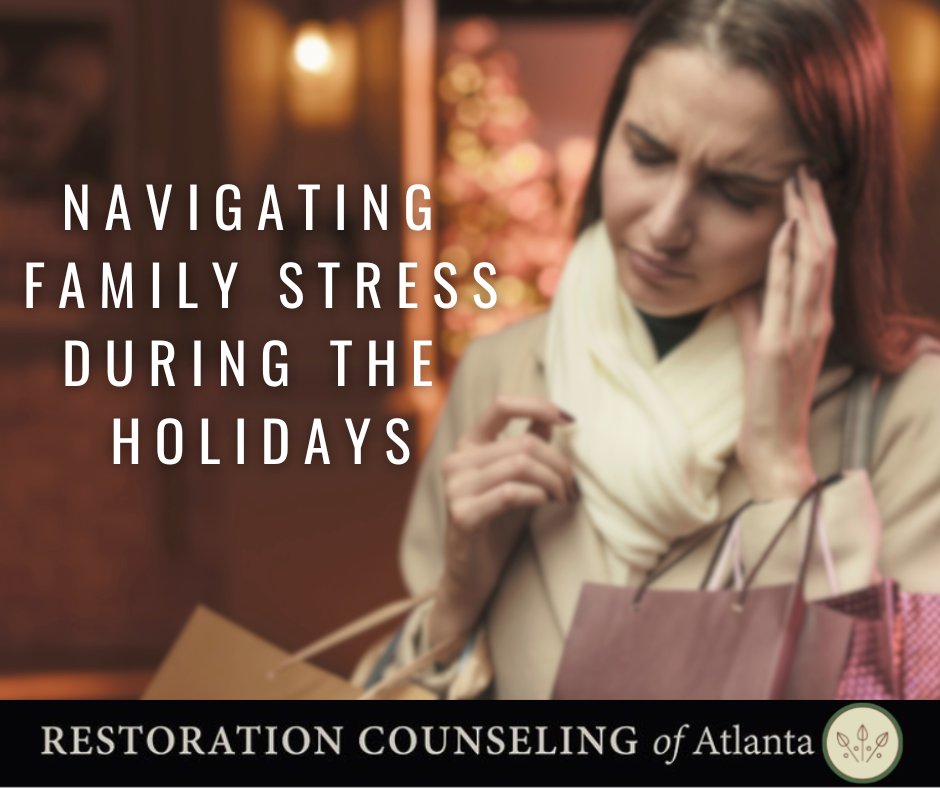The holiday season can be an enjoyable time of togetherness and celebration. Families who have moved away might be able to reconnect in the same space. However, for some individuals, spending time with family during this season can be a source of stress and tension.
If you have a strained relationship with your parents, children, partner, or in-laws, you might experience a sense of dread as the end of the year approaches. Here are a few basic principles to navigate family stress during the holidays.
Set Realistic Boundaries and Expectations
One key to navigating family stress during family gatherings is to set realistic expectations. Understand that no family is perfect, and conflicts or stressors are not uncommon. By managing your expectations, you can reduce disappointment and frustration. Maybe you can turn your expectations or disappointments into a prayer.
Setting clear boundaries with family members is crucial for maintaining your emotional well-being. Politely decline activities or discussions you find stressful or triggering, and communicate your boundaries respectfully. A boundary is not a boundary unless it has a consequence. Consequences, such as reduced opportunity for in-person gathering, need to be communicated graciously ahead of time and upheld if violated.
Decide When to Respond
Not every disagreement or comment requires a response. Learn to choose your battles and let go of minor irritations. Focus on what truly matters to you and your well-being.
One must understand the capacity of the difficult person. They might not be able to understand you, meet your needs, or be willing to admit that they wronged you in the past.
As you anticipate meeting up with your family, notice we often have roles (the baby, the favorite). Even in adulthood, we find ourselves reverting to those roles and actions when gathered together. Your responsibility includes re-educating others on the manner of treatment you desire. Clarification in these areas might take several interactions and help from a support system.
Practice Assertive Communication
In the event of conflicts or challenging conversations, practice assertive communication. Express your feelings and needs using “I” statements, and actively listen to others. Additionally, asking more questions and seeking clarification can lead to more productive discussions and a reduction of defensiveness.
Accepting the Good and The Bad
In Dr. Henry Cloud’s Changes that Heal, he speaks about accepting the good and the bad within a circumstance. Commonly, there is a desire for an ideal version of a person (even a difficult individual). However, there is typically a gap between an ideal vision of the individual and the reality of being in a relationship with that person. Identify if you have negative feelings of sadness, disappointment, and even anger toward the gap and how they fall short of meeting your expectations.
The key to interacting with a difficult person or group of people is to refrain from internalizing their chaos. Do not surrender your inner peace by accepting any negative beliefs about yourself. Create a plan for interaction with that difficult person. Take responsibility for your feelings and control what you can.
Proverbs 4:23 states, “Above all else, guard your heart for everything you do flows from it.” (NLT)
Seek Support and Empathy
Sometimes, discussing your feelings and family stressors with friends, a therapist, or a support group can provide valuable perspective and emotional relief. Don’t hesitate to seek support outside of your family circle. It would be wise to schedule an appointment with a therapist or gather with members of your support system shortly before or after spending time with difficult family members.
Practice empathy by attempting to understand the perspectives and motivations of family members who may contribute to your stress. This empathetic approach can foster understanding and reduce tension.
Create Moments of Solitude, Reflection and New Rituals
Amid family gatherings, find opportunities for brief breaks or moments of solitude to recharge and collect your thoughts. Even a short walk or a quiet corner for reflection can make a significant difference while navigating family stress.
Reducing screen time, especially on social media, can help avoid negative comparisons and unrealistic holiday expectations. Use technology mindfully and prioritize in-person interactions.
Focus on the positive holiday traditions, love, the hope that Christ’s birth brings, and rituals that deliver joy to your family. If old traditions are a source of tension, consider creating new ones that promote faith, unity, celebration, and connection. Be open to trying different activities and creating new rituals that promote positivity and provide a sense of purpose.
Conclusion
Setting realistic boundaries and assertive communication of your expectations is crucial in navigating family stress during the holidays. Remember that managing family stress is an ongoing process that might require the support of friends, family, or a therapist. It is perfectly normal to experience moments of frustration or disappointment. These strategies may help effectively manage and mitigate stressors, allowing you to focus on creating new traditions, joy, love, and connection during the holiday season.

Written by James E. Francis, Jr., EdD, APC
james@restorationcounselingatl.com, ext 118
James has a heart for helping males struggling with anxiety, anger, depression, life transitions, resilience, and spiritual maturity. He also sees clients dealing with grief, infidelity, and pornography addiction. He has experience in marriage counseling and premarital counseling. James keeps it real, believes in second chances, and loves to meet others where they are.

